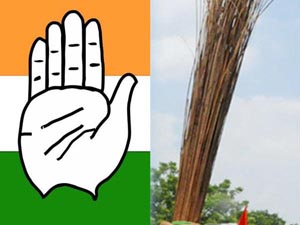New Delhi, May 18: Delhi Congress today said it will prefer fresh election in the city then supporting the Aam Aadmi Party again to form a government as favoured by a section of AAP MLAs following the drubbing in Lok Sabha polls.
Chief Spokesperson of Delhi Congress Mukesh Sharma said AAP has no moral right to talk about formation of a government in Delhi again after it went to the Supreme Court seeking dissolution of the assembly and demanding fresh election.
"There is no question of extending support to AAP to form a government again. Arvind Kejriwal had deserted people of Delhi by resorting to theatrics. He had gone to the Supreme Court seeking dissolution of the House. We will not support the party again," Sharma said.
After its spectacular performance in the assembly polls, the AAP drew a blank in the Lok Sabha polls though its candidate came second in all the seven constituencies relegating all the sitting Congress MPs including Kapil Sibal, Ajay Maken and Krishna Tirath to the third position.
"Congress never withdrew support to AAP government. Kejriwal quit the government and left the people of Delhi in a lurch to gain political mileage in the Lok Sabha polls. As they did not succeed in the Lok Sabha polls, they are talking about forming government again," said Sharma.
In the Lok Sabha polls, BJP not only won all the seven seats but also came first in 60 assembly segments out of 70 while AAP occupied top position only in 10 assembly segments.
Following the party's dismal performance, some MLAs of the AAP yesterday had mooted a proposal for the party to once again form government in Delhi, with support from either the Bharatiya Janata Party (BJP) or the Congress.
A section in the party feels that it should not opt for going to polls immediately and should explore forming the government again.
Sources in AAP said majority of sitting MLAs in the party did not want to fresh election immediately thinking the "Modi wave" may flatten them all if polls are held anytime soon.
Accusing Kejriwal of "helping" BJP by ensuring "division of secular votes" in Delhi and elsewhere, Sharma also did not rule out the possibility of some AAP MLAs defecting to the saffron party.
"Kejriwal has been helping BJP. He ensured BJP's sweep in Delhi through division of secular votes. There is a possibility of some AAP MLAs defecting to BJP. If that happens, then Kejriwal will be responsible," said Sharma.
He said notwithstanding Congress' poor show, the party was ready for fresh election.
"We are ready for elections," Sharma said.
The BJP has already said that it would prefer fresh election than forming a government through "manipulation".
"Kejriwal has been helping BJP. He ensured BJP's sweep in Delhi through division of secular votes. There is a possibility of some AAP MLAs defecting to BJP. If that happens, then Kejriwal will be responsible," said Sharma.
He said notwithstanding Congress' poor show, the party was ready for fresh election.
"We are ready for elections," Sharma said.
The BJP has already said that it would prefer fresh election than forming a government through "manipulation".BJP's vote share in Lok Sabha polls in the city had also jumped to 46.1 per cent from 33.07 per cent in the assembly polls.
AAP's vote share had also went up to 32.9 per cent in the Lok Sabha polls from 29.49 per cent it had received in the assembly polls in December last year.
The Congress vote share had come down drastically from 24.55 per cent to 15.1 per cent.
The AAP had won 28 seats in its debut assembly elections in December last year and had later formed the government with outside support from the Congress' eight MLAs.
The BJP along with its all Akali Dal’s one MLA had won 32 seats in the 70-member assembly. The government led by Kejriwal resigned after the party's pet project—the Janlokpal Bill—could not be passed due to opposition from the BJP and the Congress.
This, however, apparently did not go down well with the people of Delhi and led to the party's lacklustre performance in Lok Sabha polls.
The AAP had filed a petition in the Supreme Court two months back challenging the decision of the Centre not to dissolve the Delhi Assembly after Kejriwal government quit office.
Lieutenant Governor Najeeb Jung had not favoured dissolution of the 70-member Delhi Assembly as recommended by the Council of Ministers headed by Kejriwal and kept the Assembly in suspended animation.





Comments
Add new comment